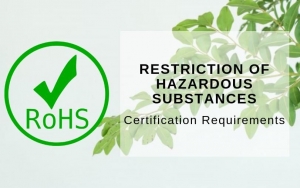ROHS Certification
About RoHS Certification
RoHS stands for Restriction of Hazardous Substances. The European Union created RoHS, also known as Directive 2002/95/E. It was created to provide restrictions on the use of certain hazardous compounds in electrical and electronic equipment. RoHS standards must be met by all items marketed in the European Union from July 1, 2006. The RoHS directive defines standards for the use of hazardous substances in the manufacturing of electrical and electronic devices. It establishes guidelines for manufacturers and suppliers on how to reuse and recycle electrical and electronic trash.

Maximum limits for the following hazardous compounds are specified in the RoHS standard:
- Lead (Pb): < 1000 ppm
- Mercury (Hg): < 100 ppm
- Cadmium (Cd): < 100 ppm
- Hexavalent Chromium: (Cr VI) < 1000 ppm
- Polybrominated Biphenyls (PBB): < 1000 ppm
- Polybrominated Diphenyl Ethers (PBDE): < 1000 ppm
- Bis(2-Ethylhexyl) phthalate (DEHP): < 1000 ppm
- Benzyl butyl phthalate (BBP): < 1000 ppm
- Dibutyl phthalate (DBP): < 1000 ppm
- Diisobutyl phthalate (DIBP): < 1000 ppm
What Organizations Can Apply for RoHS Certification?
RoHS certification is necessary for exporting, producing, and importing items into RoHS-compliant regions, such as European and Asian countries (including China, Japan, and South Korea) and North American equivalents. RoHS certification is extremely important for businesses that import RoHS compliant or RoHS parallel products. All product providers, including original equipment manufacturers (OEMs), original design manufacturers (ODMs), and subcontractors, must comply with RoHS regulations.
What is the Purpose of RoHS Certification?
RoHS certification means that an impartial third party has certified a manufacturer or supplier to create items that satisfy the RoHS standard. To prevent contamination from hazardous chemicals, the RoHS standard establishes precise standards for product manufacturing, packaging, labeling, and storage. An organization that receives RoHS certification guarantees that these requirements are effectively implemented.
RoHS Certification Through IAS
The process to get RoHS Certification through IAS are as follows:
- Fill out the RoHS certification application form with all of the details about the product for which you want to obtain RoHS certification.
- Following your acceptance, a ROHS certification quotation will be provided to you.
- After the estimate is accepted, IAS will provide you with a project management plan for your RoHS certification (including test plans and test specifications). The management method, however, may change slightly depending on your demands.
- The tests are conducted under IAS supervision or at a certified laboratory.
- Once testing is finished, all data will be compiled into a RoHS certification report, together with the accompanying certificate and samples of non-RoHS compliant material. These test results are also sent to you as a backup or for future reference.
- RoHS certification takes about 15-20 working days unless the product and/or its components are difficult to test.
Advantages of RoHS Certification
RoHS certification may be a valuable marketing tool for your goods. Products that have RoHS certification are highly popular among environmentally aware consumers who are ready to pay a premium for environmental protection. RoHS certification is becoming increasingly important for manufacturers, distributors, resellers, and retailers that want to stay ahead of the competition or differentiate themselves. RoHS certification has the following benefits:
- Aids in the avoidance of costs associated with the removal of hazardous chemicals from manufacturing, assembly, and storage operations.
- Noncompliance might result in significant fines from the European Union’s RoHS regulatory body.
- The Environmental Protection Agency (EPA) and the Occupational Safety and Health Administration (OSHA) have begun enforcing environmental regulations that require RoHS certification.
- Tighter process control, fewer errors, and increased manufacturing output improved production efficiency.
- Many states are exploring more rigorous electronic component recycling or disposal rules, so it’s in the manufacturer’s best interests to be ready to execute a recycling program as needed by law.
For more information on RoHS certification and RoHS certification process, please contact us or visit our RoHS certification frequently asked questions page to learn more.
Also check out our blog on how to get ROHS Certification!
